The Neonatal Intensive Care Unit (NICU) at the University Hospital of Northern BC in Prince George serves as both a human milk collection depot and a distribution site.
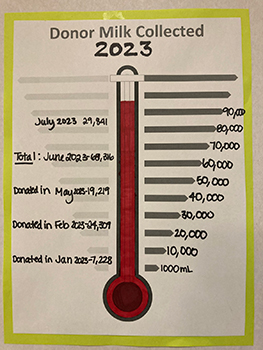
At this site, we:
- Collect milk from approved Northern donors.
- Ship it to the provincial milk bank for processing.
- Provide pasteurized donor human milk to eligible NICU babies, some of Northern BC’s youngest, smallest, and most fragile babies.
Our team recently created a poster to help raise awareness of donor human milk in Northern BC. This visual for families in NICU lets them see how much milk donors are providing, how much we feed our babies, and how many babies are getting the milk. It’s nice for us to see the tally go up and to see the benefit of the effort of our generous donors.
How much milk has been donated?
In the last four years, we have collected an average of 102,000 mL per year from approved Northern BC donors. Our highest collection year was in 2021/22, with a total of 113,300 mL.
This year, milk donations are up! In the first seven months of 2023 alone, we collected 95,000 mL of milk from eight approved donors. In other words, with five months left to go in 2023, we are already at 84 per cent of our previous highest collection volume.
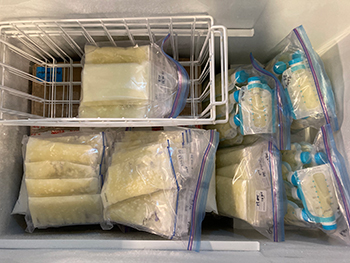
What does 95,000 mL look like? If we convert this to ounces (30 mL = 1 fluid ounce), this is over 3,000 ounces total, or about 400 ounces per donor. Let’s assume that a donor collects about four ounces each time they pump their milk. This means that, on average, each of the eight donors pumped 100 times, or once per day for three months, in order to provide all this milk. What a gift!
We are excited to see how much is being donated. We know that these volumes are a significant contribution of donors’ time, energy, and care. Read more about our generous Northern BC donors and why they give the gift of their milk: Got milk? Northern moms donate to human milk bank for babies in need.
How much milk has the NICU provided to babies?
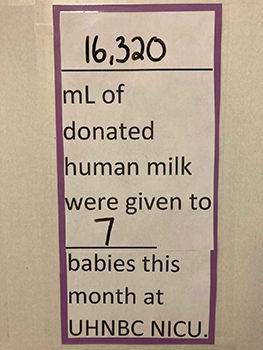
Our poster also provides monthly data on how much donor milk we provide to babies in the NICU. In July 2023, we provided a total of 16,320 mL (544 ounces) of pasteurized donor human milk to seven different babies.
The amount of donor milk a NICU baby receives depends on a few factors. For example:
- Very premature babies need to transition from intravenous feeds to tube feeds. To prepare their immature digestive systems, we start by feeding them as little as 10 - 20 mL (less than an ounce) per day.
- Other babies receive 300 – 400 mL (10 to 13 ounces per day).
These babies receive the lifesaving protection of donor milk while their parents work to establish their own milk supply. Learn more about the families who have experienced this precious gift: Got milk? Vulnerable Northern babies receive donor milk from provincial human milk bank.
Learning about the importance of donor milk
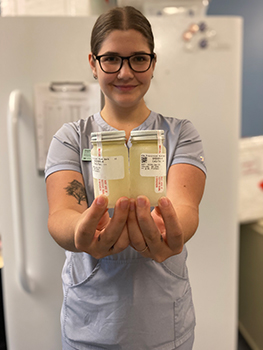
Stephanie Mosley is an employed student nurse on our unit. During her time with us, she has been learning about the importance of donor milk. She shares her thoughts:
"Before starting in NICU, I didn't realize the importance of donor breast milk. However, I've learned it is extremely beneficial for our premature babies, allowing them to have a quicker recovery with less adverse events. It also takes the stress off of moms who are working to build their milk supply.”
The whole team, all of us, are beyond thankful for the donations. A huge thank you to the donors in our region and across the province who make this possible!
Interested in learning more about human milk donation?
- Donor human milk – Northern Health

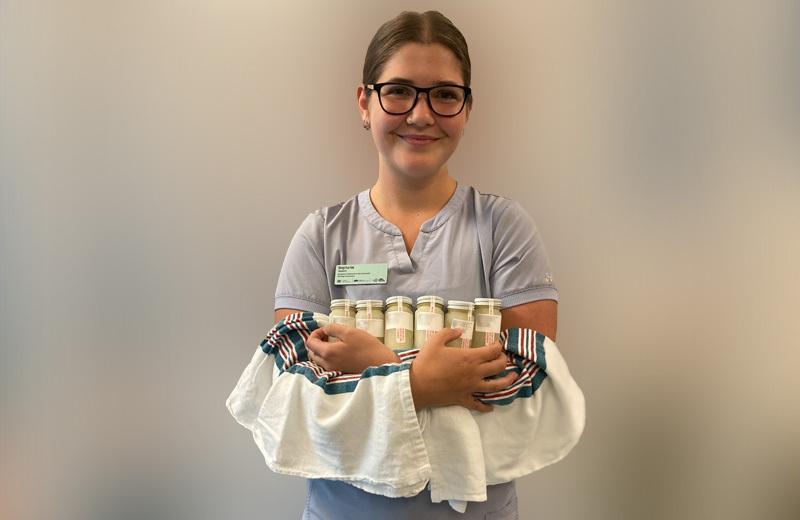






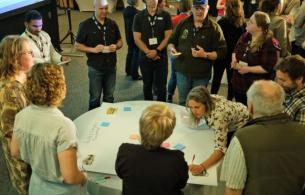

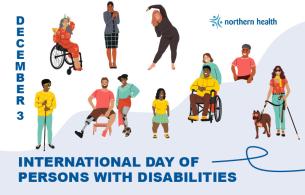
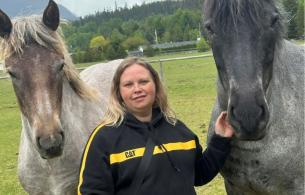
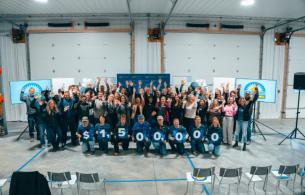

Comments